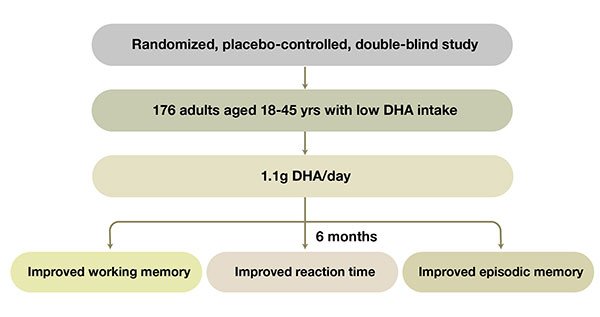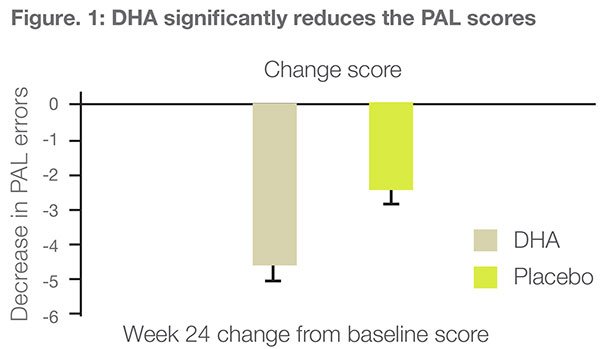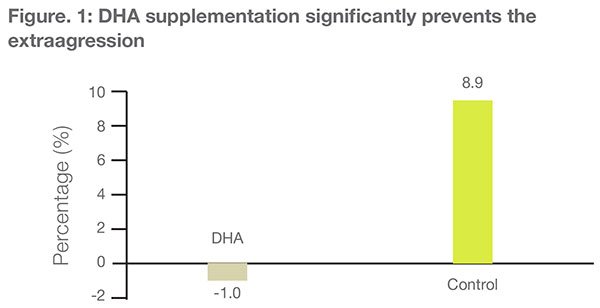DHA Improves Memory and Reaction time in Adults
Objective
DHA is known to be important for normal brain function and therefore it is reported that in persons with low dietary consumption of polyunsaturated fatty acids (PUFAs), the supplementation with DHA might improve cognitive function.
This study was performed to evaluate the effects of DHA supplementation on cognitive performance in healthy young adults.
End points measured
Cognitive performance (memory, attention and reaction time {RT}) by using computerized cognitive test battery

Results
- The Reaction time (RT) of episodic and working memory significantly improved in DHA therapy in comparison to placebo (mean difference (95% CI): -0.18 SD (-0.33, -0.03 SD) (p=0.02) vs. -0.36 SD (-0.58, -0.14 SD) (p=0.002), respectively).
- DHA improved the episodic memory in women (0.28 SD {0.008, 0.48 SD}; p=0.006).
- The RT of working memory in men also improved [-0.60 SD (-0.95, -0.25 SD);p=0.001].
Conclusion
DHA supplementation significantly improved memory and reaction time in healthy young adults whose diets were low in DHA.
Source
Stonehouse W, Conlon CA, Podd J, et al. DHA supplementation improved both memory and reaction time in healthy young adults: a randomized controlled trial. Am J Clin Nutr. 2013;97(5):1134-1143.
DHA Improves Learning and Memory Function in Age-related Cognitive Decline Patients
Objective
DHA, the principle omega-3 fatty acid in brain, plays a very important role in neural function. Reductions in plasma DHA levels has been associated with cognitive decline in elderly and Alzheimer’s patients.
This study was performed to assess the beneficial effects of DHA in improving cognitive function in healthy older adults with age-related cognitive decline (ARCD).

Study design
Randomized, double-blind, placebo-controlled, clinical study.
Number of subjects
485 subjects with ≥ 55 y of age with Mini-Mental State Examination >26 and a Logical Memory (Wechsler Memory Scale III) baseline score ≥ 1 standard were enrolled.
Study intervention
900 mg of DHA or placebo per day respectively.
Duration of the study
24 weeks.
Primary outcome measures
CANTAB Paired Associate Learning (PAL), a visuospatial learning and memory test
Results
- Significantly lower levels of fewer PAL six pattern errors were reported in the DHA group in comparison to the placebo (difference score, -1.63±0.76 [-3.1,-0.14, 95% CI], p<0.03) (see Fig. 1).
- DHA significantly decreased the heart rate from baseline.
- DHA supplement also improved immediate and delayed Verbal Recognition Memory scores (p<0.02).
Conclusion
DHA supplementation is significantly beneficial in improving learning and memory function in ARCD patients.
Source
Mauro YK, McCarthy D, Hall EB, et al. Results of the MIDAS trial: Effects of docosahexaenoic acid on physiological and safety parameters in age-related cognitive decline. Alzheimers Dement. 2009; 5(4):P84.
DHA Reduces Depressive Symptoms and Risk of Progression to Dementia
Objective
It is found that the depressive symptoms may augment the risk of progression from mild cognitive impairment (MCI) to dementia. Consumption of n-3 PUFA may relieve both depression and cognitive decline.
The aim of this study was to investigate the beneficial effects of omega-3 PUFAs on depressive symptoms, quality of life (QOL) and cognition in elderly people with MCI.
Study design
Double-blind, randomized controlled trial.
Number of subjects
50 people aged >65 years with MCI were enrolled into the study.
Duration of the study
6 months
Study intervention
| Groups | Intervention | Number of subjects (n=) |
|---|---|---|
| Rich in DHA | 1.55g DHA + 0.40 g EPA/day | 18 |
| Rich in EPA | 1.67g EPA + 0.16g DHA/day | 17 |
| Linoleic Acid(LA) | 2.2 LA g/day | 15 |
DHA supplementation benefited mental health in older people with MCI
Results
- The geriatric depression scores (GDS) were significantly improved in both DHA and EPA group in comparison to LA (p=0.01, and p=0.04).
- The verbal fluency (Initial letter frequency) improved in the DHA group (p=0.04).
- The self-reported physical health was positively associated with increased DHA levels.
- Furthermore, the increased levels of DHA plus EPA were correlated with improved levels of GDS scores (r=0.398, p=0.02).
Conclusion
Omega-3 PUFAs supplement significantly reduced the depressive symptoms and altered the risk of progression to dementia.
Source
Sinn N, Milte CM, Street SJ, et al. Effects of n-3 fatty acids, EPA vs. DHA, on depressive symptoms, quality of life, memory and executive function in older adults with mild cognitive impairment: a 6-month randomized controlled trial.Br J Nutr. 2012;107(11) : 1682169
DHA Significantly Reduces the Risk of All Cause Dementia
Objective
Docosahexaenoic acid is the major fatty acid found in the brain and several researches have shown that the DHA content in the brain and plasma is reduced in patients with dementia.
The aim of this study was to assess the association between plasma phosphatidylcholine (PC) DHA concentration and risk of developing dementia.
Study design
A prospective follow-up study.
Number of subjects
899 men and women of median age 76 years without dementia at the baseline.
Study intervention
A mean follow-up of 9.1 years was done to assess the development of all-cause dementia and Alzheimer disease (AD).

Results
- After adjusting variables, the subjects with highest quartile of PC DHA were associated with significantly lower risk for developing all cause dementia and Alzheimer's disease (Relative risk {RR} 0.53 {95% CI, 0.29-0.97: p=0.04} and RR 0.61 {95% CI, 0.31-1.18, p=0.14}), respectively.
- A 47% of reduction in the risk of developing all cause dementia was reported
Conclusion
It was concluded that the highest quartile of PC DHA levels were associated with a significant reduction of developing all cause dementia
Source
Schaefer EJ, Bongard V, Beiser AS, et al. Plasma phosphatidylcholine docosahexaenoic acid content and risk of dementia and Alzheimer disease: the Framingham Heart Study. Arch Neurol. 2006;63(11):1545-1550.
DHA Prevents the Extraggression of Mental status
Objective
DHA is found in the phospholipid fraction of the brain and is a major polyunsaturated fatty acid of the brain .It was not known whether supplemental DHA has any effects on the higher functions of the brain in young adults. So, this study was conducted to assess the efficacy of DHA in preventing aggression in adults.

Study design
A placebo-controlled double-blind study.
Number of subjects
41 young adults.
Study intervention
1.5-1.8 g of DHA daily (n =22) or control oil (n =19).
Duration of the study
3 months
The stability in extraggression percentage in the DHA group indicates aggression-controlling effects of DHA
Results
- DHA therapy caused significant alterations in the extraggression (aggression against others) in comparison to the placebo group, where it was significantly increased (see Fig. 1) (p=0.0029).
- The 95% CI difference between the DHA and control groups were found to be -16.8% to -3.0%, respectively.
Conclusion
DHA supplementation significantly prevents extraggression in young adults
Source
Hamazaki T, Sawazaki S, Itomura M, et al. The effect of docosahexaenoic acid on aggression in young adults. A placebo-controlled double-blind study. J Clin Invest. 1996;97(4):1129-1133













